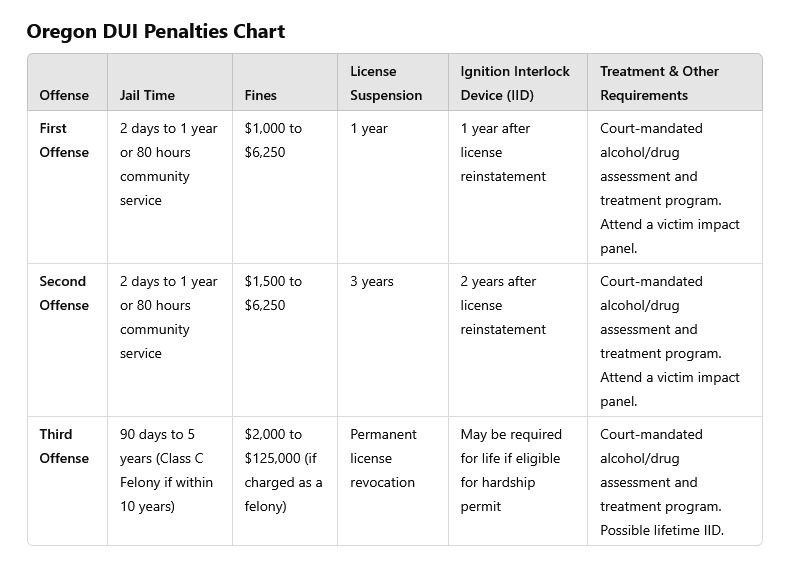Feb 11th, 2025
Oregon DUI Penalties Chart
How Many DUI’s Were Issued in Oregon in 2024?
Examining the Impact on Public Safety and the Penalties for a DUI
Driving under the influence (DUI) continues to be a critical public safety issue in Oregon, posing serious risks to drivers, passengers, and pedestrians alike. In 2024, DUII (Driving Under the Influence of Intoxicants) statistics revealed a concerning trend, emphasizing the ongoing challenges faced by law enforcement and communities across the state. Understanding the numbers, the consequences, and the proactive steps being taken to address impaired driving is essential for creating safer roads and informed citizens.

Additional Notes on Oregon DUI Penalties:
1. DUII Diversion Program:
The Oregon DUII Diversion Program is an alternative sentencing option available to first-time DUII offenders who meet certain eligibility requirements. This program allows offenders to avoid a conviction by successfully completing a series of court-ordered requirements, which typically include:
- Alcohol and Drug Assessment and Treatment: Participants must undergo an assessment to determine the extent of substance use issues and follow through with recommended treatment or educational programs.
- Victim Impact Panel: Attendance at a victim impact panel, where individuals affected by DUII incidents share their experiences, is mandatory. This aims to increase awareness of the consequences of impaired driving.
- Ignition Interlock Device (IID): Offenders must install an IID on any vehicle they drive, which measures blood alcohol content before the vehicle can be started. The device must be maintained and used without any failed tests for a specified period.
- No Additional Criminal Offenses: Participants must not commit any further criminal offenses during the one-year diversion period.
- Completion and Dismissal: If all conditions are met successfully, the DUII charge is dismissed, and the offender avoids a conviction. However, if the terms of the program are violated, the case proceeds to sentencing, and the offender faces standard DUII penalties.
- Eligibility Requirements: To qualify, the offender must not have participated in a diversion program within the past 15 years, must not have been involved in an accident resulting in injury or death, and must not have commercial driving privileges at the time of the offense.
2. Aggravating Factors:
Oregon law imposes enhanced penalties for DUII offenses involving certain aggravating factors, which include:
- High Blood Alcohol Concentration (BAC): If the BAC is 0.15% or higher, fines are typically increased, and longer license suspension periods may be imposed.
- Minor Passenger: If a minor under the age of 18 (and at least three years younger than the driver) is present in the vehicle at the time of the offense, the penalties are significantly harsher. This includes higher fines, extended jail time, and a longer mandatory IID period.
- Accidents or Injuries: If the DUII offense involves an accident that causes injury or death, the offender faces felony charges, leading to more severe penalties, including lengthy prison sentences and substantial fines.
- Previous Convictions: Repeat offenders within a 10-year period face increased fines, mandatory minimum jail sentences, and longer periods of license suspension or revocation.
- Refusal to Submit to Testing: Refusal to submit to a breath, blood, or urine test under Oregon’s Implied Consent Law leads to enhanced administrative penalties, including longer license suspensions and mandatory IID requirements.
3. Felony DUII:
A Felony DUII in Oregon occurs under the following conditions:
- Third Offense within 10 Years: A third DUII conviction within a 10-year period is automatically classified as a Class C Felony, resulting in severe penalties.
- Penalties for Felony DUII:
- Jail Time: A mandatory minimum of 90 days in jail, with potential imprisonment of up to 5 years, depending on the circumstances and the offender’s criminal history.
- Fines: Fines can range from $2,000 to $125,000, especially if the offense resulted in injury or property damage.
- Permanent License Revocation: Upon conviction, the offender faces permanent revocation of driving privileges. In some cases, a hardship permit may be issued after a minimum of 10 years, but strict conditions apply.
- Lifetime IID Requirement: If eligible for driving privileges, the offender may be required to use an IID for life.
- Criminal Record: A felony conviction has lifelong consequences, including difficulties in securing employment, housing, and professional licenses.
- Aggravated Felony DUII: If the DUII results in severe injury or death, it may be charged as a more serious felony, leading to even harsher sentencing guidelines.
4. Implied Consent Law:
Oregon’s Implied Consent Law mandates that all drivers agree to submit to chemical testing (breath, blood, or urine) if lawfully arrested for DUII. Key details include:
- Automatic License Suspension: Refusal to submit to testing leads to automatic suspension of driving privileges:
- First Refusal: 1-year suspension.
- Second or Subsequent Refusal (within 5 years): 3-year suspension.
- Evidence in Court: The refusal to take a chemical test can be used as evidence of guilt in court.
- Implied Consent Hearing: Offenders have the right to request a hearing to contest the suspension, but strict deadlines apply.
- Enhanced IID Requirements: Offenders who refuse testing face longer mandatory IID installation periods.
- Consequences of Refusal: Refusal to test not only leads to administrative penalties but also influences the court’s sentencing decisions if convicted of DUII.

Oregon’s DUI Laws Are Stringent
With escalating penalties for repeat offenses and aggravating factors such as high BAC, the presence of minors, or involvement in accidents. The state offers a Diversion Program as a second chance for first-time offenders but enforces strict compliance requirements. For repeat offenders, particularly those convicted of a third DUII within 10 years, the consequences are severe, including felony charges, extended jail time, and permanent license revocation. Additionally, the Implied Consent Law underscores Oregon’s zero-tolerance approach by penalizing refusal to submit to chemical testing.
This expanded breakdown provides a comprehensive understanding of the consequences associated with DUII offenses in Oregon, aiding in informed decision-making and legal preparedness. If you need this formatted for a website, brochure, or legal guide, let me know!
A Closer Look at DUII Statistics in Oregon for 2024
DUII remains a significant cause of traffic fatalities in Oregon, highlighting the widespread impact of impaired driving. In 2024, alcohol was involved in 39% of all traffic fatalities in the state, reflecting a persistent and dangerous pattern. This percentage translates to approximately 5.48 drunk driving deaths per 100,000 residents, underlining the severity of the issue. Additionally, about 7.46 drunk drivers were involved in fatal crashes per 100,000 licensed drivers, revealing the stark reality of impaired driving on Oregon’s roads.
These statistics are more than just numbers; they represent the lives lost, the families affected, and the community resources strained by impaired driving incidents. Oregon’s commitment to addressing this issue is evident through its rigorous DUII laws, educational initiatives, and proactive law enforcement strategies aimed at reducing impaired driving incidents. However, the numbers also indicate a need for ongoing efforts to raise awareness, educate drivers, and implement effective prevention programs.
The Devastating Impact of Impaired Driving on Oregon’s Roads
The consequences of impaired driving extend far beyond legal penalties. When a driver operates a vehicle under the influence of alcohol or drugs, their impaired judgment and delayed reaction times significantly increase the likelihood of accidents. These accidents often result in severe injuries or fatalities, leaving a lasting impact on families and communities.
In addition to the emotional toll, impaired driving accidents carry substantial financial consequences. Medical expenses, vehicle repairs, and increased insurance premiums can burden those involved, while the legal repercussions of a DUII conviction—including hefty fines, court costs, and mandatory ignition interlock devices—further complicate the financial aftermath for offenders. Moreover, the strain on emergency services, including law enforcement, medical personnel, and the judicial system, highlights the broader societal impact of impaired driving.
Understanding Oregon’s DUI Laws and Penalties
Oregon has some of the strictest DUI laws in the country, reflecting the state’s commitment to enhancing road safety and holding offenders accountable. Penalties for DUI convictions in Oregon are severe and escalate with each subsequent offense, aiming to deter impaired driving and promote responsible behavior.
For a first DUI offense in Oregon, offenders face a minimum of 48 hours up to one year in jail, with fines ranging from $1,000 to $10,000 depending on the circumstances. A one-year driver’s license suspension is mandatory, and offenders are required to install an Ignition Interlock Device (IID) for one year after reinstatement. Additionally, participation in an alcohol or drug treatment program is mandatory. First-time offenders may be eligible for a diversion program once every 15 years, which, if successfully completed, can lead to the dismissal of the charge.
A second DUI offense carries more severe consequences, including a minimum of 48 hours up to one year in jail or up to 240 hours of community service. Fines range from $1,500 to $10,000, and a three-year license suspension is imposed. Offenders must also use an IID for two years after reinstatement and participate in an alcohol or drug treatment program. Unlike first-time offenders, those convicted of a second DUII are not eligible for a diversion program.
A third DUI offense is classified as a Class C Felony in Oregon, resulting in up to five years in state prison with a mandatory minimum of 90 days in jail. Fines range from $2,000 to $10,000, and offenders face permanent license revocation with no possibility of a hardship permit. If driving privileges are ever reinstated, the IID requirement may be indefinite. Additionally, participation in an alcohol or drug treatment program remains mandatory.
Alcohol and Drug Impairment: Root Causes and Growing Concerns
Understanding the root causes of impaired driving is essential for effective prevention. Alcohol remains the leading cause of impaired driving arrests in Oregon, contributing to the majority of DUI incidents. However, drug impairment is increasingly recognized as a growing concern, particularly with the legalization of recreational marijuana and the ongoing opioid crisis.
Driving under the influence of drugs presents unique challenges for law enforcement, as impairment is not always as easily detectable as alcohol. To address this issue, Oregon law enforcement agencies continue to enhance their training and resources for detecting drug-impaired drivers. The state also participates in national campaigns focused on educating the public about the dangers of drugged driving, emphasizing that impairment is impairment—regardless of the substance involved.
Proactive Efforts to Reduce DUI in Oregon
Oregon is committed to reducing the prevalence of impaired driving through a combination of strict laws, educational initiatives, and proactive law enforcement strategies. The state enforces stringent DUII penalties to deter offenders while simultaneously implementing public awareness campaigns to educate drivers about the consequences of impaired driving.
One of the key components of Oregon’s approach is its comprehensive educational programs, which target both new and experienced drivers. These programs focus on raising awareness about the dangers of impaired driving, emphasizing the legal, financial, and emotional consequences of a DUII conviction. Additionally, Oregon partners with local organizations to promote safe transportation alternatives, such as ride-sharing and designated driver programs, further encouraging responsible behavior.
DUI Prevention and Community Involvement
Preventing DUI incidents requires a collective effort, including educating friends and family members, speaking up when someone is about to drive under the influence, and making responsible choices when consuming alcohol or drugs. Community organizations, schools, and local businesses in Oregon actively participate in awareness campaigns, reinforcing the importance of safe driving behaviors.
Arrested for DUII in Oregon? Our DUI Defense Team Can Help
If you or someone you know has been arrested for DUI in Oregon, it’s crucial to understand your legal rights and options. A DUII conviction can have long-lasting consequences, affecting your personal and professional life. Our top-rated DUI defense team is dedicated to protecting your rights, minimizing penalties, and guiding you through the complex legal process.
Our Oregon criminal defense attorneys have the knowledge and expertise to build a strong defense tailored to your case. Whether negotiating with prosecutors, challenging evidence, or advocating for reduced sentences, our lawyers are committed to achieving the best possible outcome for you.
Don’t face a DUII charge alone. Contact our team of criminal defense lawyers today to schedule a consultation and learn how we can help defend your case. Our knowledgeable attorneys are ready to fight for your future and help you move forward.















